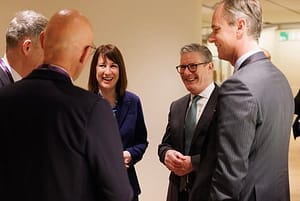FutureLearn may just be the beginning, but it’s a hugely exciting beginning
Follow me @sophiehobson and @londonlovesbiz
“Education is the most powerful weapon which you can use to change the world.” So said Nelson Mandela – and he knows a thing or two about changing the world. So what if everyone on the planet had the opportunity to access an education provided by the world’s leading academic institutions?
Humanity might not be far off that possibility. “MOOCs” stands for massive open online course. They are online courses that hope to educate anyone with internet access in a structured way, on a par with the lecture theatre or classroom. And they are free.
Some assess you as you work through an online course. My personal favourite MOOC, the US-based Khan Academy, is starting to provide assessment for many of its courses. Khan Academy is backed by the Bill & Melinda Gates Foundation, Google and Bank of America, among others. It provides video tutorials that are presented like digital blackboards with a voice-over. But this is just one example of many.
The US has been particularly good at forging ahead with MOOCs. You might have come across iTunesU on your phone, which offers video and audio lectures. Then there are the free online courses offered by Harvard, Yale, Stanford and MIT, to name but a few US universities offering MOOCs.
America also gives us the likes of Udemy, Udacity and EdX – websites featuring a range of MOOCs.
The UK is finally starting to catch up with this strand of the momentum-gathering ed-tech (education technology) wave. Today marks the launch of FutureLearn. It is a website offering free onlinecourses from a broad range of top-notch UK universities, including Bath, Birmingham, Bristol, Cardiff, Exeter, King’s College London, Leeds, Loughborough and others, and a couple of institutions such as the British Library and British Museum. (Oxbridge is conspicuous by its absence.)
The project is overseen by the Open University, but unlike the OU’s usual offerings, all FutureLearn courses are free. You simply register to begin on the given week, then work through a certain number of hours’ worth of tutorials each week. You can get a certification if you successfully complete a course.
At the moment the number of courses is fairly limited – I count 20. But this is a decent first step into what I hope will become a much larger shift towards a new style of education.
Because just imagine what education will look like when MOOCs get really good – you could work your way through a course in a way that was automatically completely personalised to your own pace of learning.
You could share your thoughts, questions and realisations with anyone in the world, through forums, video uploads, online collaborative projects and video chat.
You might start a MOOC as a creatively-frustrated accountant in Camden, and end it with an in-depth understanding of sustainable product design. Along the way, you might have made the online acquaintance of a like-minded MOOC student in South Sudan, and thereafter work together online to design a new type of cheap and easy-to-construct accommodation that could be implemented across the Ajuong Thok refugee camp. After all, you’re in London with the connections to the NGOs and funding, and Marioma is in South Sudan, working out the best way to implement your idea on the ground.
This might sound far-fetched and dreamy, but I believe that when online education gets good enough, and when internet connection across the world becomes accessible enough, fantastical possibilities like this could crystallise into world-changing realities.
It’s when you start thinking about MOOCs alongside the work of the likes of Raspberry Pi that things get interesting. This (British) Cambridge-based charity builds credit-card-sized computers that cost as little as $25. You plug them into a TV and keyboard, and away you go. “We want to see it being used by kids all over the world to learn programming,” explains the website.
But we still need internet access in this equation to make the most world-changing possibilities of education-for-all possible. Cue the corporates. Coca-Cola has created Happiness Refill, which provides free WiFi from its vending machines. Google is planning to build blimps and high-altitude balloons that will bring massive wireless networks to Southeast Asian and Sub-Saharan African areas outside major cities, with the aim of connecting a billion people to the web.
The launch of FutureLearn today might not be the complete revolution that some were hoping for – critics are saying that it is not really what students want and is relatively limited. As Stephen Caddick, vice-provost for enterprise and professor of organic chemistry and chemical biology at UCL, has noted, MOOCs are still very expensive for universities to develop, and “someone has to pay and the costs of innovation are not trivial, nor easy to recover if the fee-free model persists”.
And he’s right that there isn’t much funding around from the UK government for education at the moment – student fees being a case in point. But corporates and philanthropists may well step in where governments can’t or won’t.
Corporates already are in fact stepping in, as a glance at any of the backers of the aforementioned sites will tell you. It’s in their interests after all – the more Google supports projects that get people from all corners of the planet engaged with the wider world through the internet, the more users it gains.
And there is a huge financial opportunit
y for British companies in the ed-tech space – as Vince Cable made clear a number of times at the LibDem conference when he stressed the importance of “educational exports” to the future of the UK economy. Colin Stanbridge, CEO of the London Chamber of Commerce & Industry, is among several well-placed experts who have told me about the large Brazilian appetite for British education, as just one example of a potential market.
The emergence of British ed-tech businesses like Flooved, alongside support projects for ed-tech businesses like the Edtech Incubator, suggest to me that ed-tech is an exciting, lucrative and fast-growing tech niche.
When the interests and ambitions of businesses, idealists and technologists align, I believe very exciting things can happen. It feels like that is happening in education now, and that the UK is properly initiating itself into the movement.
MOOCs in their current form may be just the beginning of this movement, and there may be significant obstacles to overcome before we can get anywhere close to a world-wide connected, self-educating, educated world population.
But if Nelson Mandela was right, then every development in MOOCs becomes a pretty exciting prospect, if you want the world to change.
- Follow me @sophiehobson and @londonlovesbiz
- Try our free newsletter






Leave a Comment